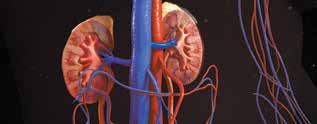
3 minute read
ANZUP Trials - Kidney
ANZUP are currently running a number of kidney cancer trials. For more details information about these trials, go to the ANZUP kidney cancer trials web page: http://bit.ly/ANZUPkidney
Status: Open & recruiting
Location: Australia wide
Activated sites: 15
Patients recruited: 42 • Patients required: 70 The most common kind of advanced kidney cancer is called clear cell kidney cancer. This trial aims to improve survival rates for people with this cancer.
Renal cell carcinoma (RCC) is the 7th most diagnosed cancer in Australia and the 14th most common cancer in Western populations. Approximately 90% of kidney cancers are renal cell carcinomas (RCC). At the moment the five-year survival rate for Australians diagnosed with kidney cancer is 78.5%, although most people with kidney cancer localised only to the kidney can be cured.
Immune therapies have been shown to be effective in about a quarter of patients with clear cell renal cell carcinoma after the standard treatment (sunitinib or pazopanib) has failed.
This study will test if denosumab, a drug frequently used to treat osteoporosis, (thinning of the bones), can team up with immune therapy to improve survival and increase the chance of the cancer shrinking for people with clear cell kidney cancer.
In the trial, people with advanced clear cell kidney cancer will be offered treatment with two antibodies (a type of protein). This trial will investigate if these drugs taken together can increase the ability of the body’s immune system to attack kidney cancer cells.
It is hoped that by combining pembrolizumab with denosumab, will stimulate the immune system, so that the immune therapy will work better in the tumours. ANZUP collaborates with the University of Sydney through the NHMRC CTC to conduct the KEYPAD Trial.
We thank and acknowledge Amgen and MSD for providing product and funding to support our KEYPAD Trial.
We are currently running the KEYPAD trial at the following locations:
NSW •Calvary Mater Newcastle •Northern Cancer Institute •Concord Repatriation General Hospital •St George Hospital •Border Medical Oncology Research Unit •St Vincent’s Hospital Sydney
QLD •Royal Brisbane & Women’s Hospital • Sunshine Coast University Hospital • Icon Cancer Care • The Townsville Hospital
SA •Flinders Medical Centre
VIC •Eastern Health •Monash Health Clayton •Ballarat Oncology and Haematology Services
WA •Fiona Stanley Hospital
UNICAB
Status: Open & recruiting
Location: Australia wide
Activated sites: 11
Patients recruited: 17 • Patients required: 48
This study aims to find how safe, tolerable and effective a new treatment called cabozantinib is for non-clear cell kidney cancer.
All patients will take cabozantinib orally every day, until the medication is no longer effective. There is no placebo (inactive treatment), which means that everyone who takes part in the trial will receive the active cabozantinib drug.
Cabozantinib is an anti-cancer drug that works by blocking cancer cell growth. Cabozantinib has previously been used in the treatment of many cancers, including clear cell kidney cancer and thyroid cancer. However, it has not been tested in people with non-clear cell kidney cancer.
Cancer trials can be undertaken in different settings. Depending on the trial, it may occur in a hospital, a clinic or the patient’s home.
We are currently running the UNICAB trial at the following locations:
NSW •Border Medical Oncology •Calvary Mater, Newcastle •Campbelltown Hospital •Macquarie University •St. George Hospital
QLD •Royal Brisbane & Women’s Hospital
SA •Adelaide Cancer Centre •Flinders Medical Centre
VIC •Goulburn Valley Hospital, Shepparton (teletrial) •Eastern Health •Monash Medical Centre, Clayton
ANZUP collaborates with the Centre for Biostatistics and Clinical Trials (BaCT) to conduct the UNICAB Trial. We thank and acknowledge Ipsen for providing product and funding to support our UNICAB Trial.









